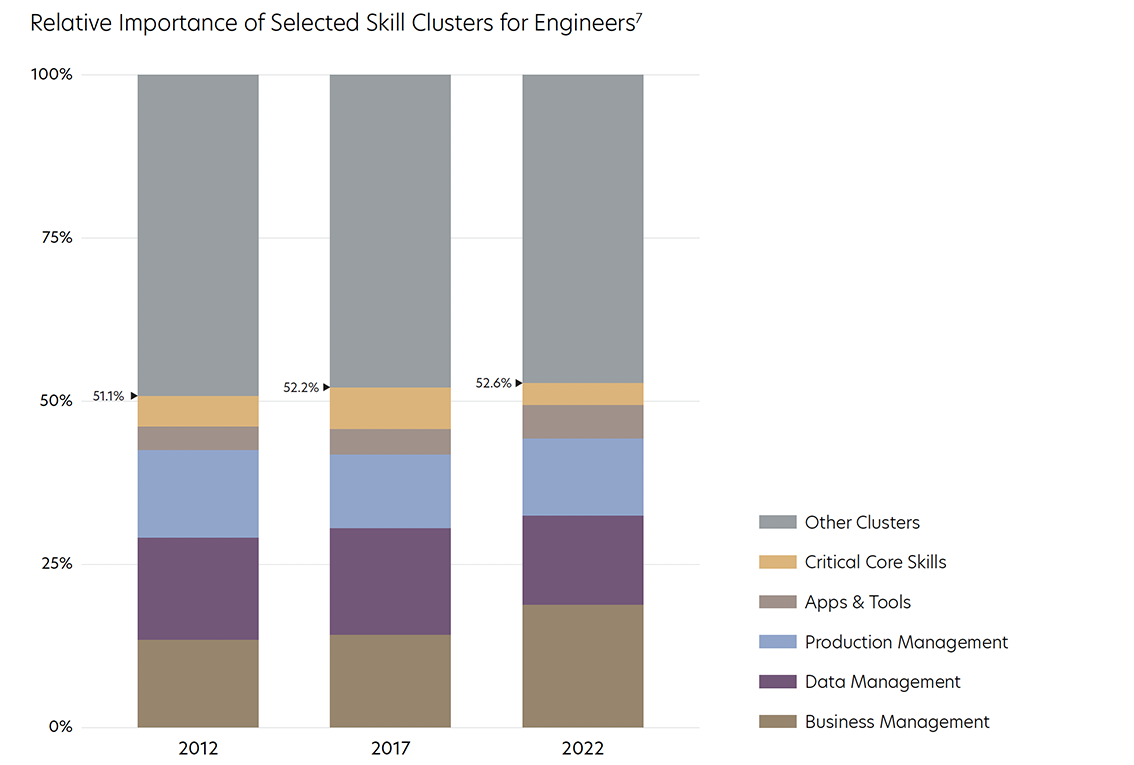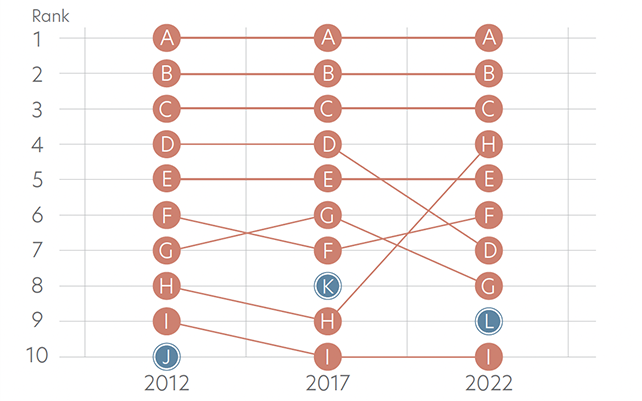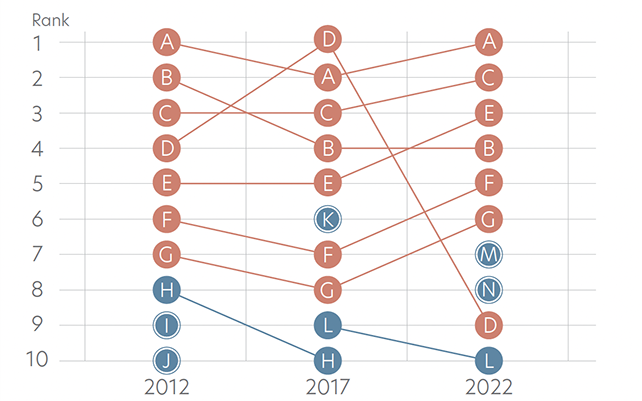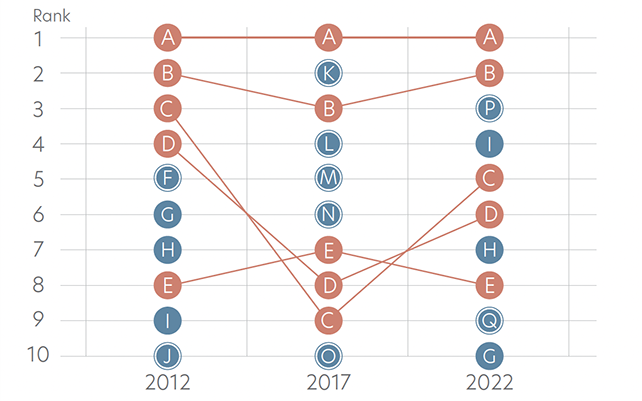Engineers
 7Base on Singapore Standard Occupational Classification (SSOC) Code141. 'Engineering professionals I'.
7Base on Singapore Standard Occupational Classification (SSOC) Code141. 'Engineering professionals I'.
Engineers are increasingly required to possess Business Management skills and utilise digital Apps & Tools.
In 2022, the hiring demand for engineers reached 134,767 job posts, which is extremely high. New areas of growth in engineering, which includes I4.0 and sustainable engineering, drives this hiring demand.
Examples of job roles in this job family include:
- Manufacturing engineers
- Environment engineers
- Quantity surveyors
The total relative importance of Business Management, Data Management, Production Management, Apps & Tools clusters and CCS increased from 51.1% in 2012 to 52.6% in 2022.
CCS increased in relative importance for this job family, from 4.1% in 2012 to 5.8% in 2017 but decreased to 3% in 2022. Amongst the top five demanded CCS for this job family, Communication, Problem Solving, Collaboration, Creative Thinking, and Self Management also appeared in the top five demanded for the Singapore economy.
The top 10 demanded skills in the Business Management cluster remained relatively consistent over the past decade. Stakeholder Management became more important in 2022.
Top Ten Demanded Skills in the Business Management Cluster for Engineers

Titles of skills featured in this chart
- Documentation*
- Quality Assurance*
- Continuous Improvement Management*
- Quality Assurance and Audit
- Audit and Compliance*
- Process Engineering Design
- Process Improvement*
- Legal and Compliance Management*
- Process Development Management
- Internal Audit Function Management
- Brand Management
- Stakeholder Management*
Circles with outer rings denote skills that only appeared once. The complete list of skills covered, with full descriptions, is provided at the end of the chapter.
* Denotes skills that also appear in the top 10 demanded skills in the Business Management cluster in the Singapore economy in 2022.
Skills that are consistently in the top 10 list in 2012, 2017 and 2022:
- Documentation: Write clear and concise reports
- Quality Assurance: Develop and implement quality standards
- Continuous Improvement Management: Improve processes and procedures
- Legal and Compliance Management: Manage compliance with regulations
- Audit and Compliance: Develop compliance processes and audit strategy
- Process Engineering Design: Apply process design principles, standards, control, and safety for new and existing plants
- Quality Assurance and Audit: Methodological approaches to carry out security audits
- Process Improvement: Evaluate change and improvement processes
- Process Development Management: Manage process development for new or altered raw materials, catalysts, or products
Skills that appeared in 2022 but did not consistently appear in the top 10 list in 2012 and 2017:
- Stakeholder Management: Manage stakeholder expectations
The top 10 demanded skills in the Data Management cluster experienced changes over the past decade. Artificial Intelligence Application, Continuous Integration and Continuous Deployment, and Customer Data Analysis became more important in 2022.
Top Ten Demanded Skills in the Data Management Cluster for Engineers

Titles of skills featured in this chart
- Engineering Problem Solving*
- Applications Support and Enhancement*
- Programming and Coding*
- Human Resource Digitalisation*
- Automation Research and Implementation*
- Big Data Analytics*
- Applications Development*
- Systems Integration
- Naval Architecture Calculations
- Automation Process Control
- Data Protection Management
- Customer Data Analysis*
- Artificial Intelligence Application*
- Continuous Integration and Continuous Deployment
Circles with outer rings denote skills that only appeared once. The complete list of skills covered, with full descriptions, is provided at the end of the chapter.
* Denotes
skills that also appear in the top 10 demanded skills in the Data Management cluster in the
Singapore economy in 2022.
Skills that are consistently in the top 10 list in 2012, 2017 and 2022:
- Engineering Problem Solving: Use root cause analysis to solve problems
- Programming and Coding: Write code to create software programs
- Automation Research and Implementation: Automate processes using equipment and information technology
- Applications Support and Enhancement: Provide technical support and enhancements to applications
- Big Data Analytics: Analyse large datasets to find patterns and trends
- Applications Development: Develop applications from design specifications
- Human Resource Digitalisation: Innovate HR processes through digitalisation
Skills that appeared in 2022 but did not consistently appear in the top 10 list in 2012 and 2017:
- Artificial Intelligence Application: Integrate artificial intelligence into engineering processes
- Continuous Integration and Continuous Deployment: Automate code changes, testing, and deployment
- Customer Data Analysis: Analyse customer data to understand customer behaviours
The top 10 demanded Apps & Tools experienced changes over the past decade. Apps & Tools related to automation and engineering process analyses became more important in 2022.
Top Ten Demanded Skills in the Apps & Tools Cluster for Engineers

Titles of skills featured in this chart
- AUTOCAD*
- Microsoft Office (Excel)*
- SolidWorks
- PLC Programming
- Visual Basic (VB)*
- Microsoft Project
- Microsoft Office (PowerPoint)*
- C++
- Java*
- Enterprise Resource Planning System (ERP)
- CSS2/CSS3
- HTML4/HTML5
- Job Control Language (JCL)
- Moz (SEO)
- JSON
- Python*
- Kubernetes
Circles with outer rings denote skills that only appeared once.The complete list of skills covered, with full descriptions, is provided at the end of the chapter.
* Denotes skills that also appear in the top 10 demanded skills in the Apps & Tools cluster in the Singapore economy in 2022.
Apps & Tools that are consistently in the top 10 list in 2012, 2017 and 2022:
- AUTOCAD: CAD software used to create 2D and 3D drawings
- Microsoft Office (Excel): Spreadsheet software
- SolidWorks: CAD software used to create 3D models of physical objects
- PLC Programming: Programming language for industrial control systems
- Visual Basic (VB): Programming language
Apps & Tools that appeared in 2022 but did not consistently appear in the top 10 list in 2012 and 2017:
- Python: Programming language
- Java: Programming language
- C++: Programming language
- Kubernetes: Open-source container orchestration system for automating deployment, scaling, and management of containerised applications
- Microsoft Office (PowerPoint): Presentation software
Industry Voice

SIM CHER WHEE
Vice President, Global Talent Acquisition, Mobility and Immigration, Micron Technology
Micron Technology is a world leader in innovative memory solutions that transform how the world uses information. Our company has been instrumental to the world’s most significant technology advancements, delivering optimal
memory and storage systems for a broad range of applications. Having worked in the semiconductor industry for over 30 years, I have witnessed how the industry constantly evolves. While we see the memory and storage industry
growing exponentially with all the demand for data, our need for highly skilled talents grows at an accelerated rate too.
The way engineers approach engineering challenges has changed. Looking back a decade ago, Problem Solving skills were more focused on the diagnostic journey where engineers focus on data collection and analysis to make data “digestible”. Fast forward to today, with greater systems integration, artificial intelligence (AI) and automation, data is made much more available. The remedy journey on how to draw insights and recommend solutions using Data Storytelling and Visualisation has become more important for engineers.
Other than problem-solving, engineers need to have Critical Thinking, Transdisciplinary Thinking and effective Communication skills, which are Critical Core Skills essential for them to thrive at work. Engineers also need to have a growth-oriented mindset and continue to acquire skills to stay relevant and competitive. Regardless of job roles and scopes, employees need to develop T-shaped skills which include deep technical skill sets, complemented by experience, transferable skills, and an enthusiasm to learn and collaborate with others.
Inevitably, the advancement of technology will lead to changes in how we work as machine learning and AI used become more advanced. While some might express concern that technology, such as AI will replace most of the roles in the near future and eventually make humans redundant, I strongly believe that utilisation of AI amplifies the human potential and creates opportunities that we previously could not achieve. Micron is a great example of where AI empowers individuals. Tapping on big data and even machine learning, for example, generative AI, engineers can now do less manual and repetitive tasks, focus more on creative solutions and complex decision-making. We are embedding these skills as part of what we call the “citizen data scientist model” to train our engineers with these new AI skills.
Last but not least, inclusion is the foundation of a thriving workplace, leading us to innovation. According to McKinsey research, diverse and inclusive companies are 35% more likely to be better performing. It is crucial to exemplify the collective effort to nurture talents and uplift the community with diverse semiconductor and engineering industry opportunities
We greatly appreciate your feedback on the report here.